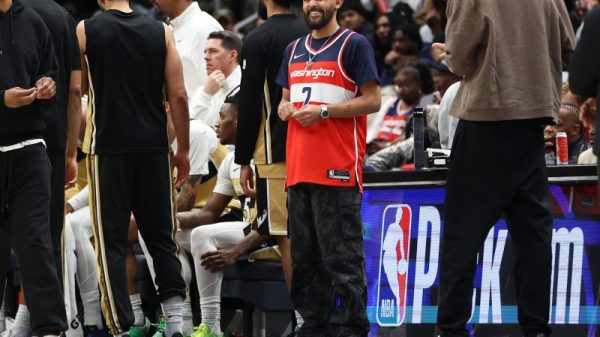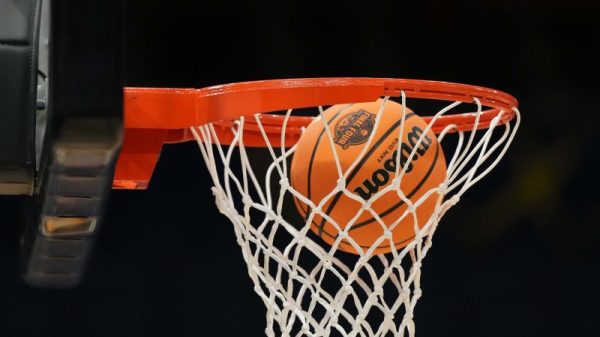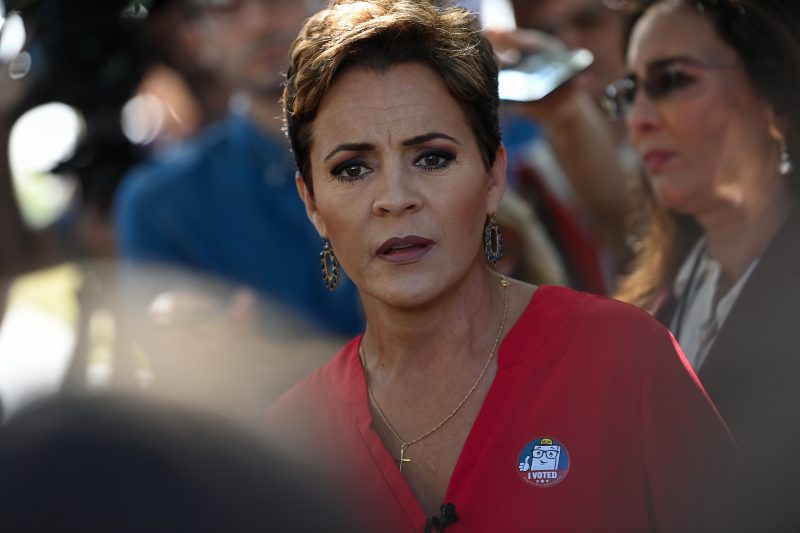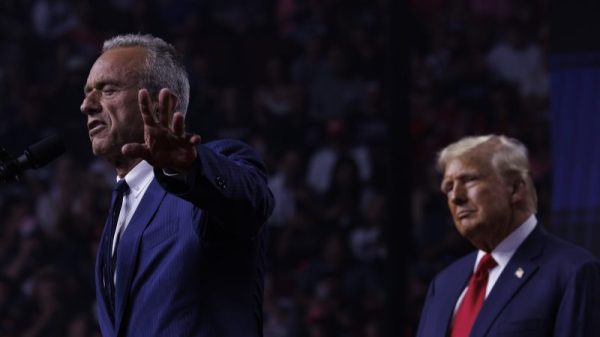PHOENIX — Six months after losing her campaign for Arizona governor, Republican Kari Lake failed to persuade a trial judge to set aside the results of the election.
Lake, a former television news personality and prominent election denier backed by former president Donald Trump, has refused to concede and mounted a legal challenge late last year, claiming that the results could not be trusted because they were tainted by fraud or mistakes. Courts rejected most of Lake’s claims, and her attorneys were sanctioned $2,000 for making “false factual statements,” but one part was allowed to go to trial: Lake’s accusation that election workers in Maricopa County, home to Phoenix and most of the state’s voters, did not properly follow a signature-verification process for early ballots.
During a three-day trial last week, Lake’s own witnesses detailed how that process did occur. Maricopa County Superior Court Judge Peter Thompson ruled Monday that Lake failed to prove misconduct or illegal conduct by county election officials. The judge also confirmed the election of Gov. Katie Hobbs (D), who beat Lake by more than 17,000 votes.
Thompson wrote that a county election director testified that the final canvass of the election results was accurate.
“No clear and convincing evidence, or even a preponderance of evidence, contradicts him,” the judge’s order said.
Lake can appeal, but the ruling represented the likely end to her legal challenge — and documented the lack of evidence for her claims. The former candidate watched some of the proceedings last week from a bench in the back of a small courtroom east of Phoenix. After the judge’s order, she posted a GIF on Twitter that read, “FIX THIS BROKEN SYSTEM.”
Here are five key takeaways from the case and the judge’s ruling:
Two witnesses called by Lake’s attorneys described in detail the pains that they and other county election workers took to compare signatures from voters’ ballot affidavits to voters’ signatures kept on file, undercutting the premise of Lake’s legal argument.
“The result was the timely verification and or … curing of about 1.4 million voter signatures,” the judge wrote in his order.
Lake’s first witness was Jacqueline Onigkeit, a county election worker who recounted for about an hour the complexities of the steps she was trained in — and took, day after day — to match signatures in batches of 250. Onigkeit said she took great care to ensure signatures matched. When they didn’t match, they were sent to another team for deeper review.
“I probably took my time to make sure, because, again, you have to scroll through those signatures,” Onigkeit testified. “Sometimes it was handwritten and then they would have a cursive, or maybe it was just a star or two s’es.”
Onigkeit also testified that managers told her and others that signatures they approved or rejected could result in them being called in to testify. “So you need to make sure that you’re really checking the signatures out before approving or rejecting,” she recalled supervisors telling her. She testified that she followed the advice.
Jack O’Connor, an attorney for the county, asked Onigkeit whether she reviewed each signature twice.
She replied, “That is correct.”
Lake’s attorneys also sought to depict that verification of at least some signatures occurred too quickly, with not enough care. They presented video captured from county cameras in November that showed two people in cubicles sitting at computer screens and scrolling through voting records as part of the signature-verification process. One worker scrolled slowly, and another scrolled quickly.
“What did you see on that video?” Kurt Olsen, a Lake attorney, asked Onigkeit.
She replied, “The person on the right was doing it correctly, and the person on the left was not.”
Reynaldo “Rey” Valenzuela, the county elections director, testified that Lake’s attorneys were misinterpreting the rapid scrolling by the person on the left. He said it probably reflected that the worker had already verified a batch of signatures and was scrolling through a second time to review his work.
Valenzuela testified that about 155 workers reviewed signatures.
“This evidence is, in its own right, clear indicia that the comparative process was undertaken in compliance with the statute,” the order said.
After Lake’s witnesses testified, a lawyer representing the secretary of state’s office questioned the need for the trial to continue because the witnesses undercut the premise of Lake’s claim. But the judge allowed the process to continue.
Thompson made clear during last week’s trial that he did not want to leave any openings for his decisions to be second-guessed.
The judge allowed Lake’s team to present theories, facts, arguments and inferences, seemingly trying to head off potential claims that the team was not given an opportunity to fully present its arguments.
At various points throughout the proceedings, Thompson appeared exasperated with Lake’s attorneys, who at times did not follow basic civil court procedures and struggled to properly introduce experts and evidence. On the second day of the trial, Olsen said he was done questioning one of his witnesses, leaving the defendants open for cross-examination, before realizing that he had more questions to ask.
The moment prompted complaints from lawyers representing the county, the governor and the secretary of state, who said Lake’s attorneys should not have been allowed to further question their witness. But the judge allowed it, even though Lake’s legal team had not followed procedures.
“I’m not trying to lay anybody’s strategy out here and flay it open,” Thompson said. “But I also don’t want some type of high-level chess going on with somebody claiming later on the rug got pulled out from underneath them.”
As the judge explained the fundamentals of civil court procedures to Lake’s attorneys, he added, “I feel like I’m teaching a seminar over here.”
Throughout the trial, Lake’s supporters attacked the judge on social media, calling him “corrupt” and saying he should be removed from office. One post on Twitter said that the judge was “thinking about how his immediate family and every relation will be murdered by the cartel if Kari Lake wins. Evil knows no limits to get its way.”
During one dramatic moment, Tom Liddy, who heads the county attorney’s office for civil litigation, urgently sought to speak to the judge and Lake’s legal team out of earshot of the rest of the courtroom. Liddy was concerned about a threat he saw online that was directed toward the judge’s family, according to a person familiar with the matter but not authorized to speak about it publicly.
Spokespeople for the county attorney’s office and the Mesa Police Department directed questions about the alleged threat to the county sheriff’s office, which did not respond to a request for comment.
As the proceedings unfolded last week, Lake’s Twitter account suggested that the trial had demonstrated widespread “corruption” within the election system — claims not even her witnesses made.
Her strongest argument was made by expert witness Erich Speckin, who described himself as a forensic document analyst with more than three decades of experience. He testified that records he received from the county suggested that the amount of time spent reviewing signatures was deficient. Based on his review of records, Speckin said, 70,000 individual signatures were given less than one second of review.
“I don’t believe it can be done,” he said. “If I can’t do it, I don’t see how anyone could do it on a mass scale, day after day after day, hour after hour, at these rates. It can’t be so.”
Lake’s attorneys argued that the fast-paced review should erode confidence in the signature-verification process. The county’s attorneys disputed Speckin’s interpretation of records he relied on for his testimony as well as his characterization of the work performed by election officials.
The judge wrote that Lake’s evidence and arguments “do not clear the bar,” partly because neither state law nor election procedures specify how much time reviewers must spend studying signatures.
“Not one second, not three seconds, and not six seconds: No standard appears in the plain text of the statute,” the judge wrote. He noted that signatures “that, by and large, have consistent characteristics will require only a cursory examination and thus take very little time.”
On cross examination, Speckin said he could not say with “100 percent certainty” that the workers did not conduct signature verification or that verification was not performed.
Speckin was involved in the Republican-led state Senate’s review of the 2020 election and participated in a Feb. 23 legislative hearing at which a witness falsely accused elected state officials of taking bribes from a Mexican cartel orchestrating election fraud. That hearing led to the recent expulsion of a Republican House member.
Soon after closing arguments, Lake’s political action committee texted her supporters and asked for money, saying that “the outcome of the election was altered,” a claim not proved in any legal case. Her fundraising messages said donations would pay for her legal team and advertising and would ensure that she “has the resources she needs to continue to fight.”
Lake is considering a run for the U.S. Senate, and she is expected to announce her plans for the 2024 race soon. On the second day of the trial, Lake told her 1.2 million Twitter followers to “mark your calendars for May 31st. You do NOT want to miss this rally in Phoenix!”
She is also said to be under consideration for Trump’s potential 2024 presidential ticket. Lake has frequently traveled to Trump’s Mar-a-Lago Club in Florida, to Iowa and to Washington, where she has met with members of Congress.
If she decides to enter the Senate GOP primary, she is widely viewed as the likely front-runner.
In Arizona, a state central to false claims of election fraud since Trump’s loss in 2020, thousands of Republicans continue to believe fictitious information about election outcomes and procedures. It’s unlikely that this legal ruling will change that, and the closing arguments from the two parties on Friday hinted at the battles ahead in the 2024 presidential election.
Liddy, the attorney for the county, said the denialism is driven partly by a rise in misinformation by online websites and Lake, who continues to tell her supporters that she won the November election and is prepared to be sworn into office as governor.
“Reasonable people can differ,” Liddy said. “Unreasonable people can differ and spew garbage on the internet that might, in fact, lower the confidence level of the public in elections, not because any particular county … didn’t do its job, but because there are misinformation, lies and filth being broadcast all over the internet 24 hours a day, seven days a week. And it’s just so possible, your honor, that some of the folks out there who are losing confidence in the elections, is because they’re reading that stuff.”
Olsen, Lake’s attorney, said “noncompliance” by election workers is what harms trust in the system.
“Election officials wield enormous power,” he said. “With that power comes responsibility — a responsibility to follow the law.”




























